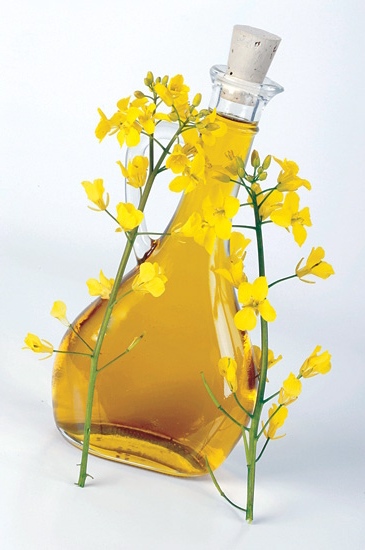What is Canola Oil
 Canola oil is extracted from the seed of hybridized rapeseed. The hybridization is very important in canola’s case because rapeseed is quite high in erucic acid, which is toxic, as it contains high levels of glucosinolates.
Canola oil is extracted from the seed of hybridized rapeseed. The hybridization is very important in canola’s case because rapeseed is quite high in erucic acid, which is toxic, as it contains high levels of glucosinolates.
Glucosinolates are notable for their interference with thyroid hormone among other things. Canadian plant breeders were able to get the levels of erucic acid in rapeseed down to very low levels, and they called the plant LEAR (low erucic acid rapeseed).
To understand how canola oil got such a prominent place in the market, let’s brush up on the food industry and medical climate of the mid-1980s. The food industry had heavily been suing polyunsaturated fats (PUFAs) such as corn and soy oils in its products as an alternative to those nasty saturated fats, which were demonized by the American Heart Association, government agencies and universities.
However, research was coming to light that high amounts of PUFAs in the diet were not exactly optimal either, and could predispose one to adverse health consequences such as cancer. Another cost-effective option was needed.
The food industry then turned its attention to the monounsaturated fats (MUFAs) because it couldn’t continue to use PUFAs with mounting evidence of health dangers, nor could it use the saturated fats like butter and lard without causing scandal.
Olive oil is perhaps the most famous MUFA, with a prominent place in the Mediterranean diet. Books, symposiums and research papers piled up around the health benefits – most notably for protecting the heart and optimizing blood lipids – of the MUFAs. However, olive oil is far more expensive to produce and olive crops take longer to grow.
A brilliant, subtle marketing campaign was launched by the food industry for canola oil. Over the years, this strategy worked perfectly. They made a calculated decision to target the ever-growing health conscious market and the educated consumer, leaving the junk food market behind. You can still find canola oil in many sterol-containing margarines and spreads today.

